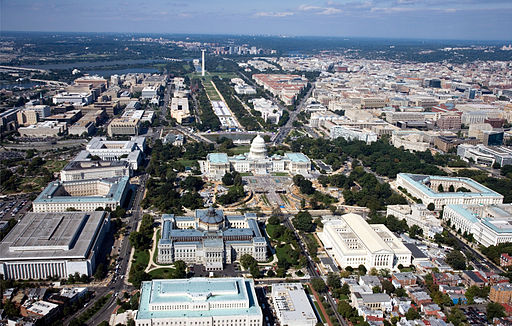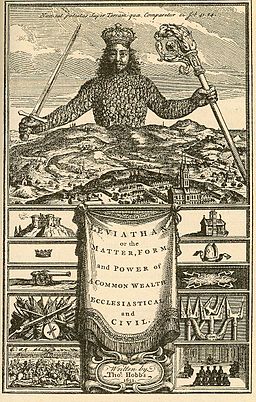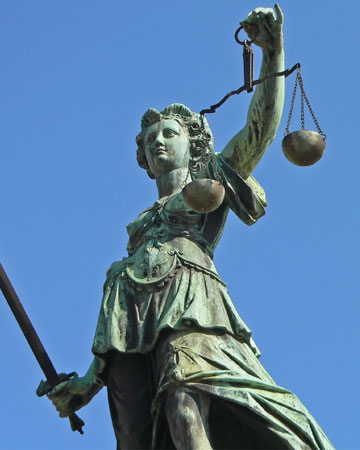Why Government and Politics?
Dr. Christopher N. Lawrence
Middle Georgia State University
POLS 1101: American Government
🔊 Disable Narration
What is Government?

A government is the set of institutions and processes that decide and implement decisions on behalf of a particular polity (a given territory or people).
Within the United States, there are many levels of government that exercise authority over communities (such as cities and counties), states, and territories, as well as our national government.
The Problem of Justice
An important role of government in any society is to provide justice: fair and equitable outcomes for the people within the society.
There are three major forms of justice:
- Retributive justice: ensuring that those who commit crimes are punished accordingly.
- Restorative justice: ensuring that the harm caused by crimes is repaired, and criminals do not reoffend.
- Distributive or social justice: ensuring a fair distribution of goods or values (material or otherwise) to individuals or groups in society.
The State of Nature
Enlightenment-era philosophers such as Thomas Hobbes, John Locke, and Jean-Jacques Rousseau had competing beliefs about society before (or without) government:
- Hobbes famously believed life for most people would be “nasty, brutish, and short” until humans banded together to create governments to protect them from others.
- Locke and Rousseau believed human nature was more peaceful and benevolent than Hobbes did, and that people did not give up their rights when they formed governments.

The Social Contract
Regardless of why humans chose to form governments, all of the social contract theorists believed that people within a society have agreed to accept certain duties and responsibilities in exchange for their government doing the same.
In our society, the primary obligation of the people is to obey the law. In return, our government protects our fundamental rights and liberties and provides public goods.
The Scope of Modern Government
Government today is less concerned with the state of nature—although there are still failed states like Afghanistan and Somalia.
Most everyone accepts the necessity of government (except anarchists), but there is still substantial disagreement among Americans about what the proper role of government in society should be.
Market Failure
In capitalist societies, government attempts to solve four major forms of market failure:
- Failure to provide public goods.
- Failure to account for externalities.
- Market power of monopolies.
- Lack of equity in outcomes.
Failure to Provide Public Goods

Public goods are essential things needed by a society that would not be provided (or would not be provided enough) by a free market.
Not everything that the government does is a public good! Examples include:
- National defense.
- A legal system (courts, prisons, etc.).
- Clean air and water.
Although these things are important, without government taxes and regulations, it would be easy for people to be free riders: to avoid doing their part to ensure these public goods were available.
The Problem of Externalities
The actions of individuals (or groups, like businesses) may have consequences that affect others.
If individuals or groups don't pay the costs of these consequences for others (or get extra compensation for the benefits from them), they are called externalities.
- Example of negative externality: pollution.
- Example of positive externality: vaccination.
Market Power and Monopolies
Under free market competition, consumers normally benefit from competition between producers and businesses to lower prices.
However, if one company controls all or most of a market, they can force consumers to pay higher prices or provide lesser quality of service.
For example, compare cell phones (where competition between several major companies leads to lower prices) to home Internet service (where only 1 or 2 companies offer service to most people).
The Problem of Equity
A capitalist economic system may not lead to outcomes that are seen as “fair,” particularly for people who cannot afford things that are seen as basic necessities.
In these cases, government steps in to ensure access to these things to everyone. Examples include:
- Food and shelter.
- Elementary and secondary education.
- Basic health care.
Prices of other goods, like water and electricity, may be also be regulated to ensure everyone can afford them.
What is Politics?
There is no single definition of politics, but two have proven to be enduring:
- 20th century political scientist Harold Lasswell: Politics is about “who gets what, when, and how.”
- Another political scientist, David Easton: “the authoritative allocation of values for a society.”

Aspects of Politics
Politics encompasses the following:
- Deciding material values.
- Deciding spiritual values.
- Deciding how to decide.
What is Political Science?
Modern political scientists apply the methods of the social sciences to the systematic study of the theory and practice of politics.
- Political science's roots are interdisciplinary, encompassing philosophy, history, law, and economics.
- Other contemporary social sciences include economics, geography, psychology, and sociology.
Personal Liberty
Locke's idea of natural rights to “life, liberty, and property” and Mill's harm principle give Americans an expectation that government will protect individual personal freedoms.
Most of these protections are examples of negative liberty: limitations on the government's power to interfere with individual freedoms. Most of the Bill of Rights, for example, uses terms that limit government power.
On the other hand, positive liberty can be thought of as the ability—not just the opportunity—to do what one wants to do.
Example: political speech.
Power and Authority
Power is the raw ability to force someone else to do something that you want them to do.
Authority is the right to exercise power in a particular circumstance. For example, the government might be said to have the authority to compel citizens to pay their taxes.
Legitimacy
The use of authority is said to be legitimate if it rests on the law and practices of a society and is recognized as such.
- Americans believe that the person who wins a presidential election has legitimacy to exercise the authority and power of the presidency.
- The illegitimate use of power or authority is usually considered illegal.
- For example: the actions of the government of the Confederacy and the states within it from 1861–65 were not seen as legitimate by the Union and do not have legal effect today.
Other Political Values
Other key political values include:
- Social order
- Justice
- Equality

The Political Community and Citizenship
In America, most people are citizens by virtue of having been born within the United States (jus soli).
Other people can become citizens through the process of naturalization, which requires legally immigrating to the U.S. and then living for several years as a lawful permanent resident.
Citizens are full members of the political community, with both legal obligations and rights.
Forms of Government
The ancient Greek philosopher Aristotle proposed a framework for understanding the types of government in his day, based on how many ruled and whether it was a “good” or “bad” (or corrupted) form:
| Form of Government | Good Variation | Bad Variation |
|---|---|---|
| Rule By One | Monarchy | Tyranny or Autocracy |
| Rule By The Few | Aristocracy | Oligarchy |
| Rule By The Many | Polity | Democracy |
While most modern political systems don't fit well into this framework, it did influence the American Founders.
Direct vs. Representative Democracy
At the time of the revolution, many leaders were deeply skeptical of unchecked democracy, which they believed would lead to “King Numbers” and tyranny of the majority.
Even today, America relies mostly on representative democracy: citizens choose leaders to govern on their behalf between elections.
Direct democracy, including the referendum and initiative, tends to be used more frequently at the state and local level, but not at the national level.
Copyright and License
The text and narration of these slides are an original, creative work, Copyright © 2000–15 Christopher N. Lawrence. You may freely use, modify, and redistribute this slideshow under the terms of the Creative Commons Attribution-Share Alike 4.0 International license. To view a copy of this license, visit http://creativecommons.org/licenses/by-sa/4.0/ or send a letter to Creative Commons, 444 Castro Street, Suite 900, Mountain View, California, 94041, USA.
Other elements of these slides are either in the public domain (either originally or due to lapse in copyright), are U.S. government works not subject to copyright, or were licensed under the Creative Commons Attribution-Share Alike license (or a less restrictive license, the Creative Commons Attribution license) by their original creator.
Works Consulted
The following sources were consulted or used in the production of one or more of these slideshows, in addition to various primary source materials generally cited in-place or otherwise obvious from context throughout; previous editions of these works may have also been used. Any errors or omissions remain the sole responsibility of the author.
- Barbour, Christine and Gerald C. Wright. 2012. Keeping the Republic: Power and Citizenship in American Politics, Brief 4th Edition. Washington: CQ Press.
- Coleman, John J., Kenneth M. Goldstein, and William G. Howell. 2012. Cause and Consequence in American Politics. New York: Longman Pearson.
- Fiorina, Morris P., Paul E. Peterson, Bertram D. Johnson, and William G. Mayer. 2011. America's New Democracy, 6th Edition. New York: Longman Pearson.
- Lenz, Timothy O. and Mirya Holman. 2013. American Government. Gainesville, Fla.: University Press of Florida.
- O'Connor, Karen, Larry J. Sabato, and Alixandra B. Yanus. 2013. American Government: Roots and Reform, 12th Edition. New York: Pearson.
- Sidlow, Edward I. and Beth Henschen. 2013. GOVT, 4th Edition. New York: Cengage Learning.
- The American National Election Studies.
- Various Wikimedia projects, including the Wikimedia Commons, Wikipedia, and Wikisource.